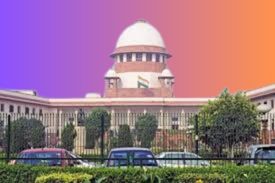A batch of writ petitions filed before this Court under Article 32 of the Constitution in February 2023, raised concerns over the precipitate decline in investor wealth and volatility in the share market due to a fall in the share prices of the Adani Group of Companies. [“Adani group”] The situation was purportedly caused by a report which was published on 24 January 2023 by an “activist short seller”, Hindenburg Research about the financial transactions of the Adani group. The report inter alia alleged that the Adani group manipulated its share prices and failed to disclose transactions with related parties and other relevant information in violation of the regulations framed by SEBI and provisions of securities’ legislation. Significantly, the report expressly states that Hindenburg Research took a short position in the Adani group through US-traded bonds and non- Indian traded derivative instruments. (Para 1)
A brief overview of the petitions follows:
a. The petitioner in WP(C) No. 162 of 2023, raises concerns about the drastic fall in the securities market, the impact on investors, the purported lack of redressal available and the disbursement of loans to the Adani group allegedly without due procedure. The petitioner inter alia seeks the constitution of a committee monitored by a retired judge of this Court to investigate the Hindenburg Report;
b. The petitioner in WP (C) No. 201 of 2023 submits that the Adani group is in violation of Rule 19A of the Securities Contracts (Regulation) Rules, 1957 by “surreptitiously controlling more than 75% of the shares of publicly listed Adani group companies, thereby manipulating the price of its shares in the market.” The petitioner inter alia seeks a court-monitored investigation by a Special Investigation Team[“SIT”] or by the CBI into the allegations of fraud and the purported role played by top officials of public sector banks and lender institutions;
c. The petitioner in WP (Crl.) No. 57 of 2023 seeks directions to the competent investigative agencies to (i) investigate the transactions of the Adani group under the supervision of a sitting judge of this Court; and (ii) investigate the role of the Life Insurance Corporation of India and the State Bank of India in such transactions;
d. The petitioner in WP (Crl.) No. 39 of 2023 seeks the registration of an FIR against a certain Mr Nathan Anderson (the founder of Hindenburg Research) and his associates for short-selling and directions to recover the profits yielded by short-selling, to compensate the investors.
In a nutshell, the conclusions reached in this judgement are summarized below:
a. The power of this Court to enter the regulatory domain of SEBI in framing delegated legislation is limited. The court must refrain from substituting its own wisdom over the regulatory policies of SEBI. The scope of judicial review when examining a policy framed by a specialized regulator is to scrutinise whether it violates fundamental rights, any provision of the Constitution, any statutory provision or is manifestly arbitrary;
b. No valid grounds have been raised for this Court to direct SEBI to revoke its amendments to the FPI Regulations and the LODR Regulations which were made in exercise of its delegated legislative power. The procedure followed in arriving at the current shape of the regulations does not suffer from irregularity or illegality. The FPI Regulations and LODR Regulations have been tightened by the amendments in question;
c. SEBI has completed twenty-two out of the twenty-four investigations into the allegations levelled against the Adani group. Noting the assurance given by the Solicitor General on behalf of SEBI we direct SEBI to complete the two pending investigations expeditiously preferably within three months;
d. This Court has not interfered with the outcome of the investigations by SEBI. SEBI should take its investigations to their logical conclusion in accordance with law;
e. The facts of this case do not warrant a transfer of investigation from SEBI. In an appropriate case, this Court does have the power to transfer an investigation being carried out by the authorized agency to an SIT or CBI. Such a power is exercised in extraordinary circumstances when the competent authority portrays a glaring, willful and deliberate inaction in carrying out the investigation. The threshold for the transfer of investigation has not been demonstrated to exist;
f. The reliance placed by the petitioner on the OCCPR report to suggest that SEBI was lackadaisical in conducting the investigation is rejected. A report by a third-party organization without any attempt to verify the authenticity of its allegations cannot be regarded as conclusive proof. Further, the petitioner’s reliance on the letter by the DRI is misconceived as the issue has already been settled by concurrent findings of DRI’s Additional Director General, the CESTAT and this Court;
g. The allegations of conflict of interest against members of the Expert Committee are unsubstantiated and are rejected;
h. The Union Government and SEBI shall constructively consider the suggestions of the Expert Committee in its report detailed in Part F of the judgment. These may be treated as a non-exhaustive list of recommendations and the Government of India and SEBI will peruse the report of the Expert Committee and take any further actions as are necessary to strengthen the regulatory framework, protect investors and ensure the orderly functioning of the securities market; and
i. SEBI and the investigative agencies of the Union Government shall probe into whether the loss suffered by Indian investors due to the conduct of Hindenburg Research and any other entities in taking short positions involved any infraction of the law and if so, suitable action shall be taken.
SUPREME COURT OF INDIA
2024 STPL(Web) 4 SC
[2024 INSC 3]
Vishal Tiwari Vs. Union Of India & Ors
Writ Petition (C) No. 162 of 2023 With Writ Petition (Crl) No. 39 of 2023 With Writ Petition (C) No. 201 of 2023 And with Writ Petition (Crl) No. 57 of 2023-Decided on 03-01-2024.
https://stpllaw.in/wp-content/uploads/2024/01/2024-STPLWeb-4-SC.pdf







